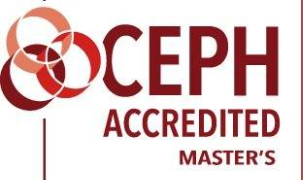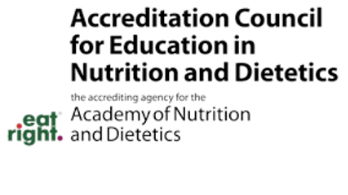Public Health (MPH) Nutrition accreditation
Northern Arizona University’s Master of Public Health program is accredited by the Accreditation Council for Education Nutrition and Dietetics (ACEND) of the Academy of Nutrition and Dietetics, and the Council on Education of Public Health (CEPH).
Mission and vision
Mission

The mission of the NAU Master of Public Health Nutrition program is to prepare graduates, through learner-centered educational strategies, research, and public service, to practice as Registered Dietitian Nutritionists who support the advancement of population health and the prevention of disease for diverse, underserved communities.
Vision
The MPH Nutrition program’s vision is to advance population health and achieve global health equity through education, research, and public service.

This program is accredited by the Council on Education for Public Health (CEPH).
Northern Arizona University’s Master of Public Health program is accredited by the Accreditation Council for Education Nutrition and Dietetics (ACEND) of the Academy of Nutrition and Dietetics. 120 South Riverside Plaza, Suite 2190, Chicago, IL 60606-6995, (312) 899-0040 ext. 5400. Upon completion of the program, graduates are eligible to sit for the Registered Dietitian Nutritionist Examination.
Northern Arizona University MPH Nutrition
Graduate Program Proposed Course Schedule
| Fall 1 | Day/Time | Spring 1 | Day/Time | ||
| HS 501 Introduction to Public Health (1) | MPH Core | Mon 4:00-4:50 | NTS 550 Human Metabolism: Macro & Micronutrients (3) | Nutr Core | Tues 4:00-6:30 |
| HS 503 Principles of Biostatistics (3) | MPH Core | Mon 5:00-7:30 | NTS 507 Medical Nutrition Therapy I (3) | Nutr Core | Tues/Thurs 12:45 – 2:00 |
| HS 612 Public Health Epidemiology (3) | MPH Core | Tues 4:00-6:30 | NTS 630 Public Health Nutrition (3) | Nutr Core | Mon 6:00-8:30 |
| HS 505 Advanced Behavior Change Counseling (2) | MPH Core | Thurs 4:00-5:40 | HS 622 Research Methods and Program Evaluation in Public Health (3) | MPH Core | Wed 4:00-6:30 |
| HS 584 Social and Structural Determinants of Health (3) | MPH Core | Wed 4:00-6:30 | NTS 520 Food Science and Culinary Arts w/lab (3) | Nutr Core | Mon 4:00-5:40 & Thurs 4:00-6:30 |
| CHEM 360 Fundamental Biochemistry (3) | Hidden Pre-req | ||||
| Total Credits: 15 | Total Credits: 15 | ||||
| Summer 1 | Day/Time | ||||
| HS 511 Introduction to Health Policy and Management (3) | MPH Core | Online | |||
| HS 572 Environmental & Occupational Health (3) | MPH Core | Online | |||
| Total Credits: 6 | |||||
| Fall 2 | Day/Time | Spring 2 | Day/Time | ||
| NTS 607 Medical Nutrition Therapy II (3) | Nutr Core | Wed 4:00-6:30 | NTS 696 Dietetics Supervised Practice Experience (5) | Nutr Core | TBD |
| NTS 607L Medical Nutrition Therapy II Lab, 45 hours supervised practice (1) | Nutr Core | Thurs 4:00-6:30 | HS 608 Public Health Applied Experience (3) | MPH Core | TBD |
| NTS 545 Advanced Foodservice Management (3) | Nutr Core | Mon 4:00-6:30 | NTS 657 Career Preparation in Nutrition & Dietetics (1) | Nutr Core | Online |
| NTS 515 Advanced Nutrition Across the Life Cycle (3) | Nutr Core | Mon 1:15-3:45 | HS 698 Graduate Seminar (3) | MPH Core | Online |
| NTS 650 Current Issues in Nutrition & Dietetics (3) | Nutr Core | Tues 4:00-6:30 | Total Credits: 12 | ||
| Total Credits: 13 | |||||
| Summer 2 | Day/Time | ||||
| NTS 696 Dietetics Supervised Practice Experience (7) | Nutr Core | TBD | |||
| Total Credits: 7 | |||||
Becoming a dietitian
Arizona does not currently require dietitians to be licensed, however, many states do. Completing an ACEND-accredited academic program alone does not qualify an individual for licensure or certification as a dietitian in any state. Individuals should review their state's licensing statutes and regulations to understand the specific requirements, including supervised practice and examinations, needed to obtain a dietetics license.
Learn more about professional licensure by state.
Learn more about what it takes to become an RDN.
Prior learning experiences
Public health and nutrition and dietetics experiences completed prior to the start of the program will not be considered as replacements of the program’s required applied experiences. Due to the nature of competency-based education, nutrition courses taken at other universities that are not accredited under Future Education Model (FEM) standards cannot be used in place of required courses for the Master of Public Health, Nutrition concentration. Syllabi for courses taken through another FEM graduate program can be submitted to the Program Director for review. While students may notice repetition in subjects from previously completed nutrition courses, this repetition supports solidifying knowledge that is essential for a successful RD exam pass rate. Graduate-level public health courses with a grade of B or higher completed prior to acceptance will be considered for transfer if the student is able to demonstrate a “meets expectations” rating for the competency assessments that are linked to the course. If the MPH Director approves the course transfer and the student completes the competency assessment at a “meets expectations” level or higher, then the student will need to find an elective course that can replace the transferred course with equivalent credits. Learn more about the NAU policy regarding transferring graduate credits. Request approval by sending the syllabus for the course to the MPH Program Director.
Admissions Policies
Northern Arizona University’s graduate admission policy requires that students have a minimum of a 3.0 GPA. The policy also states, “Admitted students are expected to have undergraduate educational experiences, including general education studies, that are similar to those required for a baccalaureate at Northern Arizona University. Students holding a cumulative GPA below a 3.0 may be considered for conditional admission with a recommendation and rationale from the admitting academic program.” However, only U.S. based applicants are eligible for conditional admission. International applicants must have met all requirements at the time of their application (i.e. they must already have a GPA ≥ 3.0 on a 4.0 scale and must already have their prerequisite(s) completed). Conditional admission is not permitted, per the Graduate College, for international applicants.
MPH Student Selection Committees for each concentration recommend acceptances to the Graduate College and the Graduate College has the final say in admission decisions. At least 2 MPH Selection Committee faculty members review each application and then the entire selection committee meets to make admission decisions. Conditional admission may be offered to qualified U.S. applicants if they have an undergraduate GPA under 3.0 and/or if they have not yet completed the prerequisite requirement(s) at the time of the admission decision.
The MPH Nutrition Student Selection Committee additionally holds 15-minute video conference interviews with the top 20 nutrition applicants in order to admit 12 students per year. Applicants are evaluated based on their GPA; writing ability (as demonstrated in the personal statement); general fit for the program based on career goals and interests; previous experience managing multiple commitments; interest, experience and readiness to serve underserved communities; and letters of recommendation. If a U.S. applicant has a GPA less than 3.0, life and work experiences, writing abilities, overall fit for the program, GPA of the last 60 units and general grade trajectory are all looked at when considering conditional admission.
We only have Fall admission to our MPH program. The priority deadline for applications is January 15th and the final deadline is April 1st. International applicants must apply by the priority January 15th deadline to be considered, due to the lengthy process to obtain funding and a student visa. We review complete applications that are submitted by January 15th and offer our first round of acceptances in late January. If any spaces still remain after the priority date applications are reviewed, we then review non-international applications that were submitted between January 16th and April 1st. In our MPH Nutrition concentration, we typically fill all spaces by the January 15th deadline but for our MPH in Health Promotion and Health Promotion-Indigenous Health we typically accept some applicants who submitted by the priority January deadline and others who submitted by the April deadline. We do not offer deferrals of admission.
Grading Policies: Program Retention & Remediation Procedures
Should the student struggle to perform at graduate-level standards within a class or APE setting, the student is encouraged to arrange remedial instruction with the course instructor. Course instructors can provide tutoring during scheduled office hours, or by appointment. If the student’s GPA falls below a 3.0 the student will be required to set up a remedial instruction contract with the program director.
Should the graduate project or APE require more time than allotted, the student may request an “In-Progress” grade by filling out a form in the department office. Students must be making satisfactory progress in a course in order to receive a grade of “IP.” Graduate students may complete “IP” grades until the time limit on their academic plan expires.
A student, who, for reasons beyond the student’s control, is unable to complete course requirements during the instructional period may make a request or submit a petition to the instructor for a grade of Incomplete (“I”). The student must be passing the course and must have completed a majority of the course. Non-attendance, poor performance, or intentions to repeat the course do not justify issuance of an “I” grade. Instructors cannot assign an “I” grade unless the terms to resolve the Incomplete are finalized and an Incomplete Contract is completed before the course ends. For graduate students, any grade of Incomplete becomes a permanent “I” on their transcript if a grade is not assigned within one regular semester following the due date listed in the Incomplete Contract. View this university policy for complete information.
Graduate students must maintain good academic standing in order to be eligible to continue in or return to the University. Good Academic Standing is demonstrated by:
- a 3.00 grade point average (GPA) for all courses taken including those required in the program of study,
- no more than 6 units of “C” course grades*, and
- no course grades of “D” or “F.”
View the disciplinary and termination policies set by the graduate college for additional information.
Academic Integrity Standards
Students will be held to the NAU Academic Integrity Policy.
